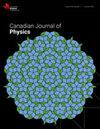Ab initio study on the spectroscopic and radiative properties of lithium monocarbide
IF 1
4区 物理与天体物理
Q3 PHYSICS, MULTIDISCIPLINARY
引用次数: 0
Abstract
High-level electronic structure calculations were conducted for LiC molecule and compared to other theoretical results. The potential energy curves (PECs) for the 18 states originating from the first three dissociation channels of LiC molecule were calculated by the internally contracted multireference configuration interaction (icMRCI) method. The spectral constants, vibrational energy levels are reported. The transition properties for the a2Π, b2Δ, c2Σ-, d2Σ+, and 22Π states are discussed. In addition, the spin-orbit coupling (SOC) effects were taken into account in the electronic transition d2Σ+ - a2Π. The b2Δ and c2Σ- states had radiative lifetimes of approximately 0.03-16.83 and 0.86-8.06 ms, respectively. The d2Σ+ and 22Π states had radiative lifetimes of approximately 1.94 - 64.83 and 0.31 - 16.59 µs, respectively. Between these transitions, the emissions from the d2Σ+ - a2Π, 22Π - c2Σ-, 22Π - b2Δ, and 22Π - a2Π systems were strongest, while the emissions from the c2Σ- - a2Π, b2Δ - a2Π, and 22Π - d2Σ+ systems were weaker. The d2Σ+1/2 state had radiative lifetimes of approximately 3.75 - 29.81 µs. Among the spontaneous emissions of the transitions generated by the d2Σ+1/2 state, the emissions from the d2Σ+1/2 - a2Π1/2 and d2Σ+1/2 - a2Π3/2 systems were relatively strong and easily observed experimentally. The radiative lifetime variation law with the rotational quantum number for the d2Σ+1/2 state at rotational quantum number J ≤ 70 and vibrational quantum number ν ≤ 15 is also presented in this paper. In addition, almost all the strong emissions of the transitions were distributed in the infrared region. It is expected that the results of this study will serve as a helpful reference for future experimental and theoretical studies.单碳化锂光谱和辐射性质的从头算研究
对LiC分子进行了高阶电子结构计算,并与其他理论结果进行了比较。利用内收缩多参考构型相互作用(icMRCI)方法计算了LiC分子前三个解离通道产生的18个态的势能曲线(PECs)。报道了光谱常数、振动能级。讨论了a2Π、b2Δ、c2Σ-、d2Σ+和22Π状态的转换属性。此外,在电子跃迁中考虑了自旋轨道耦合(SOC)效应d2Σ+ - a2Π。b2Δ和c2Σ-态的辐射寿命分别约为0.03 ~ 16.83 ms和0.86 ~ 8.06 ms。d2Σ+和22Π态的辐射寿命分别约为1.94 ~ 64.83µs和0.31 ~ 16.59µs。之间的转换、排放d2Σ+ - a2Π22Π- c2Σ- 22Π- b2Δ22Π- a2Π系统是最强的,而排放的c2Σ- - a2Π,b2Δ- a2Π,22Π- d2Σ+系统较弱。d2Σ+1/2态的辐射寿命约为3.75 - 29.81µs。在d2Σ+1/2态产生的跃迁的自发辐射中,d2Σ+1/2 - a2Π1/2和d2Σ+1/2 - a2Π3/2体系的自发辐射相对较强,且易于实验观察。给出了旋转量子数J≤70、振动量子数ν≤15时d2Σ+1/2态辐射寿命随旋转量子数的变化规律。此外,几乎所有跃迁的强发射都分布在红外区。期望本研究的结果能为今后的实验和理论研究提供有益的参考。
本文章由计算机程序翻译,如有差异,请以英文原文为准。
求助全文
约1分钟内获得全文
求助全文
来源期刊

Canadian Journal of Physics
物理-物理:综合
CiteScore
2.30
自引率
8.30%
发文量
65
审稿时长
1.7 months
期刊介绍:
The Canadian Journal of Physics publishes research articles, rapid communications, and review articles that report significant advances in research in physics, including atomic and molecular physics; condensed matter; elementary particles and fields; nuclear physics; gases, fluid dynamics, and plasmas; electromagnetism and optics; mathematical physics; interdisciplinary, classical, and applied physics; relativity and cosmology; physics education research; statistical mechanics and thermodynamics; quantum physics and quantum computing; gravitation and string theory; biophysics; aeronomy and space physics; and astrophysics.
 求助内容:
求助内容: 应助结果提醒方式:
应助结果提醒方式:


